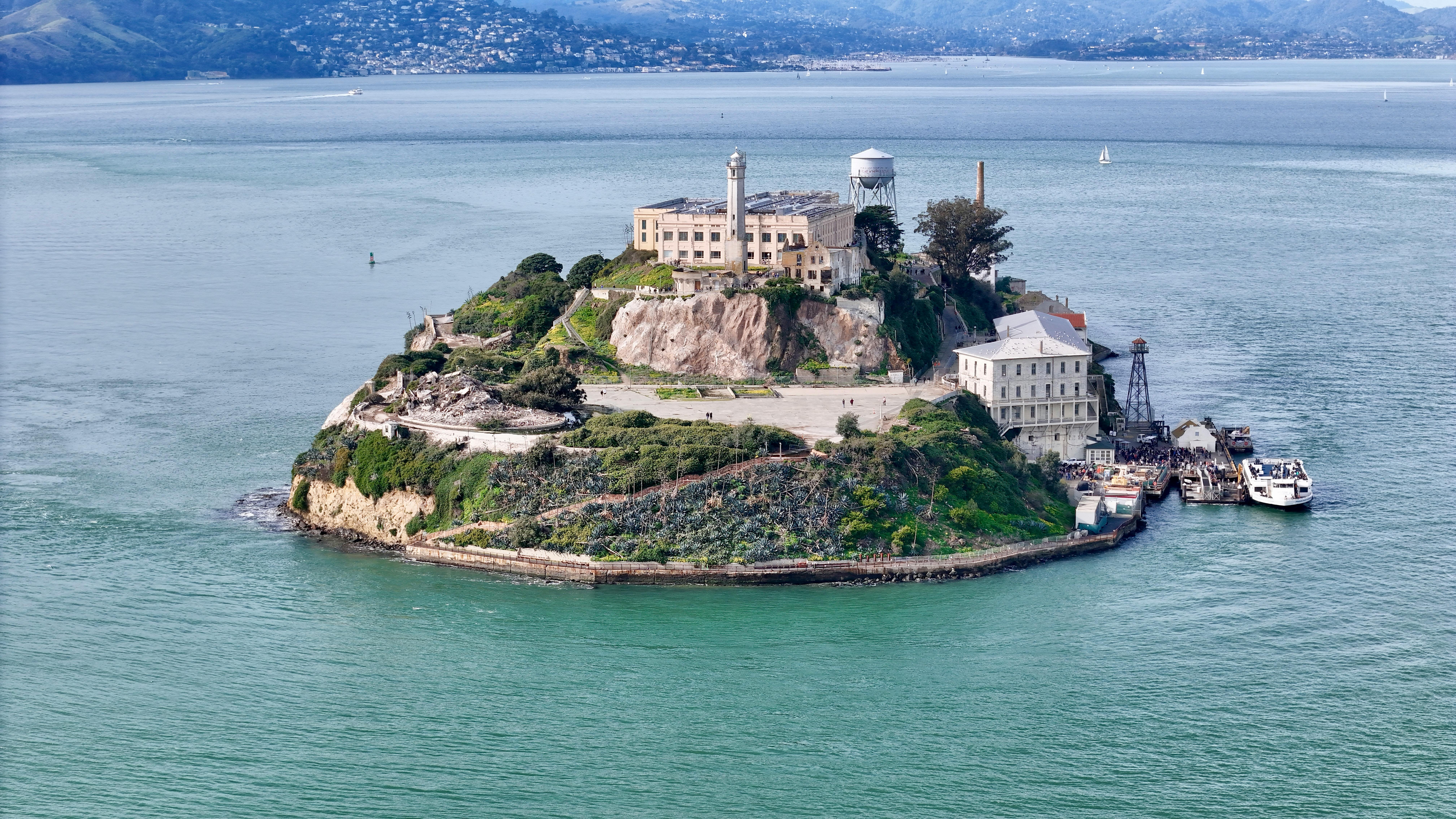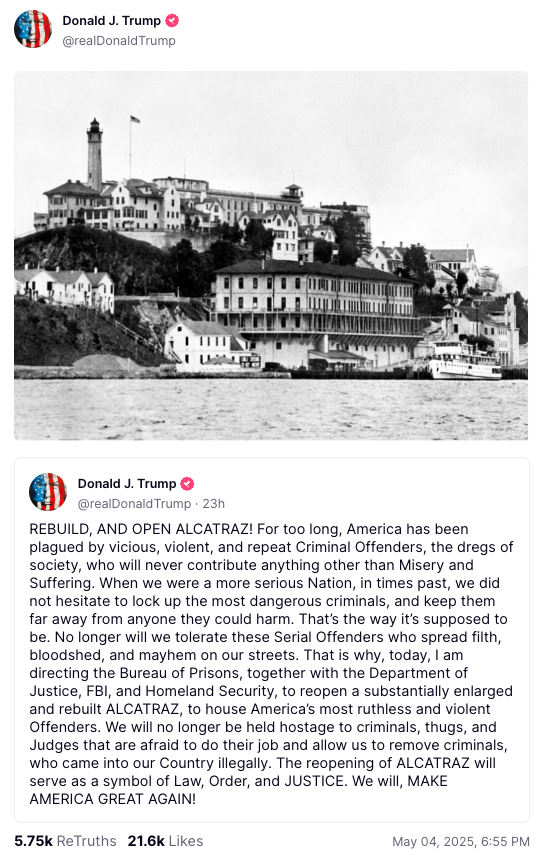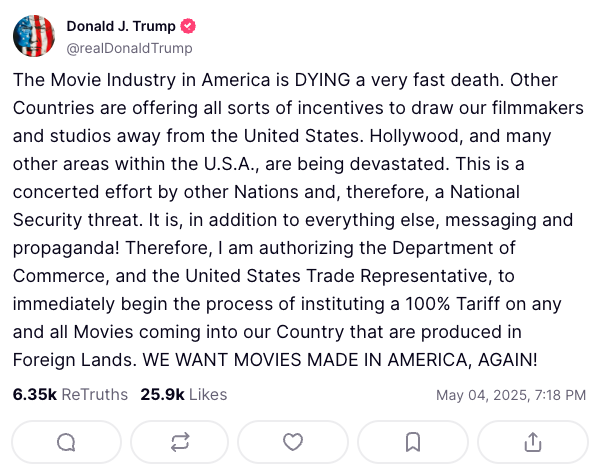The Situation: Two Modest Proposals

The Situation on Friday meditated on American exceptionalism.
Then, over the weekend, the president declared that he wanted to reopen Alcatraz and slap tariffs on foreign movies.
I confess that neither of these bold policy moves was on my mental agenda for the week. I had planned to spend the week—as I have spent the past several—thinking about compliance issues with respect to federal courts orders.
But Trump has a way of opening up new vistas for me. Before him, I never gave much thought to annexing Greenland, much less to waging war on a NATO ally in order to do so. Before Trump, I never even considered the possibility of an American occupation of the Gaza Strip. In so many ways, the man has widened my policy horizons.
And yet, I have questions about these two ideas. After reflecting on them, I honestly don’t think either is yet fully baked. And I have suggestions for the president as to how to make them better.
Let’s start with Alcatraz. We don’t normally build major prisons in the middle of urban areas. And the island is small, meaning that the idea doesn’t—in the local terminology—scale well. It can’t actually support a major prison. The largest federal prisons house more than 6,000 inmates. Alcatraz housed fewer than 300.
Okay, sure, a prison island called “The Rock” is pretty badass. And Alcatraz is cooly retro. In recent years, island prisons have come to have a Guantanamo vibe, but Alcatraz has more of a pre-9/11 Clint Eastwood, Nick Cage, Sean Connery thing going. Plus, Trump would get to own the libs by driving prisoners through downtown San Francisco or, better yet, Berkeley. And that would be pretty funny.
But I’m still hung up on what the point is. For one thing, Alcatraz has a really important current tourist function. And a lot of the people who take the ferry out to see the old prison are from red states. Does the president really want to take away a tourist destination from his voters? It’s one thing to tell them they don’t need 30 dolls, but can live with two or three. But there’s only one Alcatraz; take that away, and it’s not like there’s some other island prison they can visit.
Where are the tourists going to go? Rikers?
There are also local sporting issues. Two friends of mine recently swam from Alcatraz to San Francisco, which is a thing people do for reasons unclear to me. There’s actually an annual race in the Bay Area called, appropriately enough, Escape From Alcatraz. According to the website for the race, it’s happening in 26 days. Think of the hassle of keeping the physically fit from San Francisco from training inmates to escape.
Then there’s the small matter that the U.S. federal inmate population is actually declining. After rising steadily over the 1990s and 2000s, the population has dropped from its peak in 2013 of around 220,000 people to just under 160,000 now. So the country doesn’t exactly need new prison housing on an island in the middle of a bay in any case.
Trump’s stated policy reason for reopening Alcatraz is that, “[w]hen we were a more serious Nation, in times past, we did not hesitate to lock up the most dangerous criminals, and keep them far away from anyone they could harm.”
The trouble with this argument is that Alcatraz is not far away; it is really close to big population centers. The better case for Alcatraz appears later in Trump’s Truth Social post, where he argues precisely the opposite: that the very visibility of the prison is one of its selling points. “The reopening of ALCATRAZ will serve as a symbol of Law, Order, and JUSTICE.”

Ah, yes. And herein my suggestion: If the president wants symbolism, he can do better than Alcatraz.
I have a suggestion for Trump of another small island in a major population center currently being used for tourist purposes but which would make a far bigger statement than Alcatraz if turned into a prison. I’m talking, of course, about Liberty Island in New York Harbor.
While he’s at it, Trump could convert Ellis Island into a prison too. Imagine if the Main Immigration Building—which the National Park Service describes as “the epicenter of one of the greatest migrations in modern history” and is now “a memorial to all who pursued the American dream and have made this nation their adopted home”—were once again used to detain people. That would really sock it to those open borders people.
All of which brings me to tariffs on foreign films—if only because Trump’s social media on that subject is adjacent to the one on Alcatraz.

Now truth be told, I was unaware that there was a foreign film problem—that Americans were suddenly racing out to watch Ingmar Bergman and Jean Luc Goddard films.
That said, now that Trump has made me aware of the problem, I share his concerns. If “other Countries are,” as he says, “offering all sorts of incentives to draw our filmmakers and studios away from the United States” and “Hollywood, and many other areas within the U.S.A., are being devastated” as a result, we’ve absolutely got to do something about this rapacious assault on America. This is precisely the sort of “National Security threat”—with a capital N and a capital S—we formed Lawfare to think about.
Yet once again, I am unclear whether Trump’s solution is quite appropriate to the problem.
For one thing, I’m struggling to imagine precisely how one assesses a tariff—which is a border tax—on a movie. I don’t know exactly how one “imports” a movie made in, say, France into the United States these days, but I doubt very much that one packs the film prints into crates and puts them on boats or planes and unloads them at U.S. ports of entry where customs duties can be assessed.
So where does one assess the tax? Do you tax movie-goers at the door? Add to the price of popcorn? Or do you just raise the cost of a Netflix subscription. And if the latter, do you do it with a clear “tariff” line item, as Amazon assures us it was not planning to do with goods, or do you force Netflix to hide the cost?
So I find myself yet again wanting to offer a gentle refinement to Trump’s idea. Instead of tariffing foreign films, let’s remake them all. Got a character who’s iconically British—say, Harry Potter? Who says Hogwarts has to be set in the United Kingdom? Let’s put it in Montana. Mad Max doesn’t have to be Australian. And if Trump’s concerned about overseas filming of American movies, well, that’s what generative AI was made for. Emily doesn’t actually have to be in Paris for Emily in Paris to be a hit. It’s way cheaper to make our own Paris with ChatGPT.
Trump knows this. He knew he didn’t actually have to film his Trump AI Gaza film in Gaza. It was an inspired artistic choice.
Let Trump be Trump.
The Situation continues tomorrow.



-2.jpg?sfvrsn=f979c73d_6)

